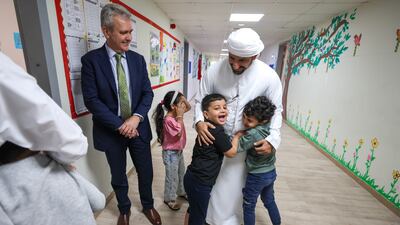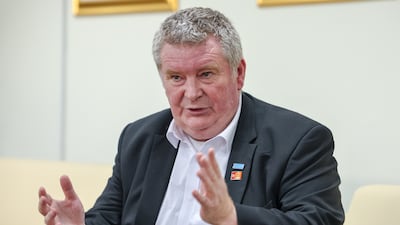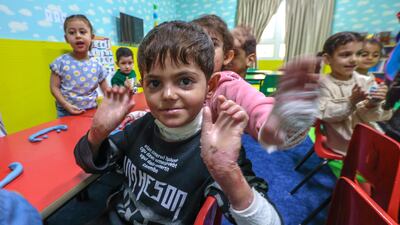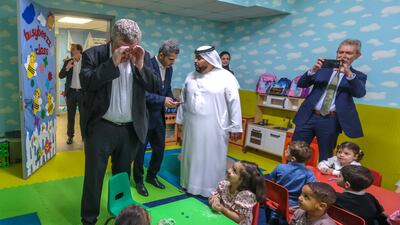Live updates: Follow the latest on Israel-Gaza
Leading World Health Organisation (WHO) officials have warned Gaza’s health system is unprepared for the challenges of the coming winter.
Speaking to The National after a tour of Emirates Humanitarian City in Abu Dhabi, where about 2,000 Gazans have been given refuge, Dr Michael Ryan, executive director of the WHO’s Health Emergencies Programme and Rick Brennan, regional emergency director in the Eastern Mediterranean, said Gaza was “not ready” and warned of a serious risk of rising malnutrition and food security issues.
They said the area’s lack of weatherproof shelters and basic necessities could have severe repercussions on health as temperatures drop.
“It is like a ticking time bomb,” Dr Ryan said. “The Middle East can get very cold in winter ... if we see a bad winter, we’re not ready for it." Much of Gaza's displaced population was currently sheltering under “plastic sheeting” rather than insulated tents that would help protect them against winter’s cold, he said.
About 43,400 are estimated to have been killed in Gaza since October 7, 2023. Last winter, Dr Ryan said many Gazans were living under the shelter of UNRWA-run schools, which have since been destroyed. Inadequate shelter compounds the risk of respiratory illnesses such as Covid-19 and flu spreading in already crowded conditions.
Watch: Gaza tailor turns blankets into winter clothes for children
His comments followed a similar warning from a senior Palestinian official who said hygiene levels will deteriorate in Gaza this winter, putting the enclave, where there is already an increased threat of serious disease, on the brink of yet another humanitarian catastrophe.
Heavy rain could mix with sewage and waste water, creating a “huge issue”, especially for Gaza’s most vulnerable groups, said Samah Hamad, the Palestinian Minister of Social Development, last month.
Alongside these seasonal concerns, the WHO is monitoring potential outbreaks of diseases such as cholera, which has recently appeared in Lebanon and could have devastating effects if it spreads to Gaza.
Dr Ryan highlighted the urgency, noting: “We’re likely to do other campaigns. We’re talking about a measles campaign because measles could be a major risk.” The effects of prolonged conflict have severely compromised Gaza’s healthcare infrastructure, already struggling to meet basic demands.
'Worst we've seen'
“This is the worst situation we’ve ever seen,” he said, comparing it to conflicts in Afghanistan, South Sudan and Syria. “We’ve been through a lot of different situations – Afghanistan, Sudan before South Sudan. This is the worst for me … Syria was also very bad.
"When you see countries that had a solid public health system, a well-nourished population, good immunisation, a strong school system and then you see all that destroyed – the difference between then and now is so extreme that it’s hard to imagine.
"You look at these kids we’re seeing today. They’re beautiful young children. How many of them will ever go home? How many will ever be able to return to Palestine? How many will ever see their families, their friends again? Some of them never will. It’s an incredibly tragic situation and it’s a historic situation for the UN because this is a population under the care of the United Nations' system. To see people under our care reduced to such suffering is terrible.”
The injuries were life-altering, according to Dr Ryan. “There are still over 2 million people in Gaza, crammed into smaller and smaller areas. The international community needs to decide if it will allow this to continue, or if it will stand up for the dignity and future of these people," he said.
Of the 36 hospitals in Gaza, only 17 are partially operational and less than 40 per cent of clinics remain open. Dr Ryan emphasised that the current crisis is unprecedented, saying: “We’d like to avoid saying that the health system in Gaza is ‘collapsed’ because, in some senses, that’s almost an insult to the health workers of Gaza, who’ve managed to keep the system running despite horrific challenges.
“The only reason that system is still functioning is because of the Palestinian doctors, nurses, physios, pharmacists and others who stay at their posts. Some are not being paid, some bring their families to work.” He recounted a sobering comment from a colleague: “I would rather we die together than die separately."
Speaking of the difficulties of providing aid, especially since the closure of the Rafah border crossing, Mr Brennan said: “We’ve conducted around 95 missions but we’ve had about 200 requests. The rest were declined, impeded or cancelled."
In September, the Israeli army acknowledged the destruction of about 96,000 homes in Gaza, claiming they were booby-trapped. The tally was said to include 14,000 homes in Rafah.
The WHO has managed to deliver essential supplies, such as fuel, medicine and limited food, to hospitals like Al Awda and Al Shifa in the last couple of weeks and has led medical evacuations from the north of Gaza. "It's sometimes challenging to get the clearance and approvals for those missions," Mr Brennan said.
Currently, the WHO oversees 16 emergency medical teams within Gaza, supported by 30 to 40 NGOs. It co-ordinates health services and supply logistics through the “health cluster”, which includes NGOs, international organisations and local staff.
Dr Ryan said: “The WHO is co-ordinating the emergency medical teams at the hospital level, NGOs providing primary health care and other services, and logistics for supplies.”
The WHO has also led polio vaccination efforts, reaching more than 94 per cent of targeted children. “The polio campaign has probably been the most successful of all the public health interventions that we’ve done,” Dr Ryan said.
Dr Ryan also discussed UNRWA’s role in supporting Palestinians, explaining that the UN created the agency to fulfil obligations under international law.
“UNRWA was created by the United Nations and its member states to support the suffering of the Palestinian people. If UNRWA’s services aren’t provided, it’s Israel’s legal responsibility to provide them,” he said, adding, “UNRWA was doing Israel’s job.” He underscored the importance of the agency’s work, noting the objective to keep the integrity of the Palestinian people intact.
Dr Ryan acknowledged the UAE’s critical support, saying: “The UAE has been a vital partner, providing day-to-day support, charter flights and the airlift of supplies.” He stressed that co-operation from partners such as the UAE will be just as essential when it’s time to rebuild Gaza.
"Our job is not to be political. We don’t take sides. Our role will be to help the Palestinian people reconstruct their health system,” he said. “Countries like the UAE have an important role to play now in this crisis and, just as importantly, when it’s time to rebuild.
“We are particularly happy about the co-operation on these medical evacuations. With the closure of the Rafah [crossing], the UAE has been the only real source of significant evacuations."






